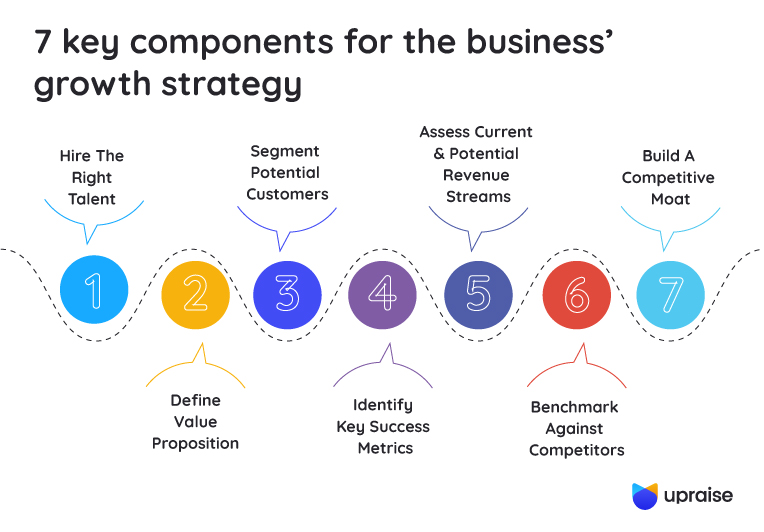Investing In Middle Management: A Key Strategy For Business Growth And Employee Retention

Table of Contents
The Crucial Role of Middle Management in Business Success
Middle managers are the linchpin connecting leadership's vision to the daily operations and the workforce. They are vital for translating strategic goals into actionable plans and providing critical feedback that informs future strategies. Effective middle management is the cornerstone of a high-performing organization.
Bridging the Gap Between Leadership and Employees
Middle managers act as a crucial bridge, ensuring clear communication flows between upper management and frontline employees. This two-way communication is paramount for:
- Improved communication flow: Facilitating the seamless transmission of information and ensuring everyone is aligned with company objectives.
- Enhanced employee engagement: Creating an environment where employees feel heard, valued, and understood.
- Effective task delegation: Distributing workloads efficiently and ensuring accountability at all levels.
Strong middle management fosters a positive work environment characterized by transparency, collaboration, and mutual respect. This directly contributes to increased organizational efficiency and a reduction in internal conflicts.
Driving Operational Efficiency and Productivity
Investing in middle management training equips them with the skills and knowledge to optimize processes and drive productivity. This investment translates into:
- Streamlined workflows: Identifying and eliminating bottlenecks to improve operational efficiency.
- Reduced errors: Implementing robust quality control measures and processes to minimize mistakes.
- Increased productivity metrics: Tracking key performance indicators (KPIs) and implementing strategies to enhance overall output.
For example, training in lean management principles can empower middle managers to identify and eliminate waste, leading to significant cost savings and increased efficiency. Investing in project management training allows them to better manage resources and deadlines, improving team performance and project success rates.
Investing in Middle Management: Training and Development
Developing middle management is not a one-time initiative; it's an ongoing process requiring continuous investment in training and development opportunities.
Investing in Leadership Skills
Leadership training programs tailored to the specific needs of middle managers are essential. These programs should focus on developing critical skills such as:
- Conflict resolution: Equipping managers with the tools to effectively address and resolve workplace conflicts.
- Team building: Fostering collaboration and strong team dynamics within their respective teams.
- Mentoring: Developing the ability to guide and support team members in their professional growth.
- Strategic thinking: Enabling managers to contribute to the organization's overall strategic planning and execution.
Training methodologies can vary from intensive workshops and online courses to mentoring programs paired with experienced senior leaders.
Providing Opportunities for Growth and Advancement
Creating clear career paths and advancement opportunities within the organization is crucial for retaining valuable middle management talent. This fosters:
- Increased employee morale: Employees are more engaged and motivated when they see opportunities for professional growth.
- Reduced turnover: Providing clear pathways reduces the likelihood of employees seeking opportunities elsewhere.
- Improved skills retention: Investing in employees' development ensures the organization retains valuable skills and expertise.
Internal promotion opportunities not only motivate employees but also strengthen their loyalty to the company, creating a culture of growth and development.
The Impact on Employee Retention
Investing in middle management has a direct and positive impact on employee retention rates, ultimately leading to significant cost savings and increased organizational stability.
Improved Employee Engagement and Satisfaction
Effective middle management significantly influences employee engagement and satisfaction. Supportive and empowering managers create a work environment where employees feel:
- Mentorship opportunities: Access to guidance and support from experienced managers.
- Open communication: A culture of open dialogue and feedback.
- Recognition and rewards: Appreciation for contributions and achievements.
These factors contribute to higher job satisfaction, increased morale, and ultimately, lower turnover rates.
Reduced Employee Turnover Costs
The financial benefits of reduced employee turnover resulting from investment in middle management are substantial. This includes:
- Reduced recruitment costs: The cost of hiring and training new employees is significantly reduced.
- Improved productivity: A stable workforce maintains consistent productivity levels.
- Maintained institutional knowledge: Losing experienced employees leads to a loss of valuable knowledge and expertise.
The cost savings associated with lower employee turnover can significantly outweigh the investment in middle management training and development.
Conclusion
Investing in middle management through comprehensive training, development, and career growth opportunities is not merely a cost; it's a strategic imperative that significantly impacts both business growth and employee retention. Strong middle management improves communication, boosts operational efficiency, fosters a more engaged and loyal workforce, and ultimately drives organizational success. Start investing in your middle management today and unlock your business's growth potential by cultivating a highly skilled and motivated leadership pipeline. Learn more about effective middle management strategies and training programs by [linking to relevant resource/service].

Featured Posts
-
 Almeria Vs Eldense En Directo Sigue El Partido De La Liga Hyper Motion
May 15, 2025
Almeria Vs Eldense En Directo Sigue El Partido De La Liga Hyper Motion
May 15, 2025 -
 500 Evra Za Patike Novakov Izbor I Na Skuplji Modeli
May 15, 2025
500 Evra Za Patike Novakov Izbor I Na Skuplji Modeli
May 15, 2025 -
 20 And Under Shop Boston Celtics Championship Gear
May 15, 2025
20 And Under Shop Boston Celtics Championship Gear
May 15, 2025 -
 High Bids Mark Kid Cudi Personal Items Auction
May 15, 2025
High Bids Mark Kid Cudi Personal Items Auction
May 15, 2025 -
 2023 Los Angeles Dodgers Offseason A Critical Analysis Of Trades And Acquisitions
May 15, 2025
2023 Los Angeles Dodgers Offseason A Critical Analysis Of Trades And Acquisitions
May 15, 2025
